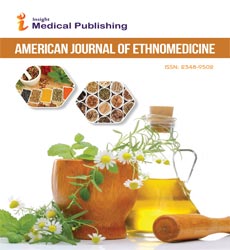ISSN : 2348-9502
American Journal of Ethnomedicine
Identification of serum biomarkers to create an athletes biological passport.
Abstract
Intense physical exercise induces metabolic and organ adaptations that result in variations in terms of concentration and activity of some biochemical and haematological parameters. The identification and monitoring of these parameters could represent a new method of clinical evaluation in athletes in order to prevent injuries, loss of shape and, above all, the appearance of some pathologies. For this study, we have recruited 12 male athletes from a professional basketball team who, with prior informed consent, underwent blood sampling in different phases of the sports season: 0 months, in the initial
phases of the championship; 1 month and 3 months after the start of the championship. Erythrocytes, hematocrit, hemoglobin, and platelets have no significant variations, but there is an increase in the mean corpuscular volume (MCV) and in the mean platelet volume (MPV) between 1 and 3 months in comparison to 0 months. CK levels have no significant variation between 0 and 3 months; whereas LDH levels undergo a slight decrease if we compare months 0 with months 3. Vitamin D levels decrease at 1 month and 3 months if compared with 0 months. Finally, cortisol and thyroid hormones levels have no significant
variation, but there is a moderate increase in the FT4 hormone at 1 month when compared to month 0. Moreover, we evaluated serum CRP levels that revealed a significant increase in 3 months if compared with month 0
Open Access Journals
- Aquaculture & Veterinary Science
- Chemistry & Chemical Sciences
- Clinical Sciences
- Engineering
- General Science
- Genetics & Molecular Biology
- Health Care & Nursing
- Immunology & Microbiology
- Materials Science
- Mathematics & Physics
- Medical Sciences
- Neurology & Psychiatry
- Oncology & Cancer Science
- Pharmaceutical Sciences
